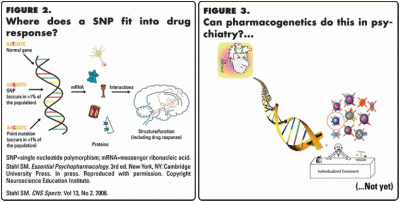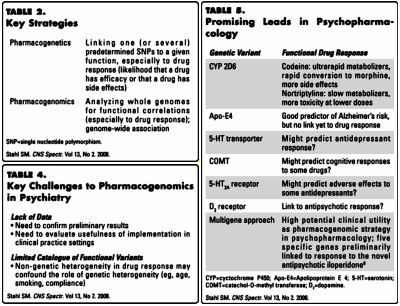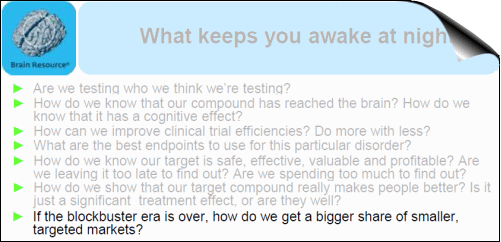On the Threshold of Predictive Therapeutics in Psychopharmacology?
by Stephen M. Stahl, MD, PhD
CNS Spectrums 2008 13(2):115-118.
[full text on-line]New Trend in Psychopharmacology: Personalizing medicine by understanding the unique properties of each patient’s genome has the potential of predicting what drug to prescribe for that individual. This approach has already proven useful for several drugs in medicine and promises to become a strategy for selection of therapeutics in psychiatry soon. Understanding some of the key concepts, strategies, and advances in the field of pharmacogenomics can set the stage for adapting emerging findings to the practice of psychopharmacology…
What is Pharmacogenetics, or is it Pharmacogenomics? … Although some experts use the terms “pharmacogenetics” and “pharmacogenomics” interchangeably, many consider pharmacogenetics to be the study of specific SNPs at specific genes with known functions that could plausibly be linked to drug response, whereas pharmacogenomics scans the whole human genome to find SNPs empirically associated with a drug response, without necessarily knowing the function of the SNP (Table 2). Pharmacogenetics tests SNPs identified in advance, such as those linked to various neurotransmitters, receptors, or growth factors, whereas pharmacogenomics scans the entire genome to determine SNPs that are associated with drug response and often identifies genes whose functions are not known or would not have been predicted in advance to be linked to drug response. In either case, SNPs (on the left in Figure 2) alter protein synthesis by making subtle molecular changes in the amino acid sequence of these proteins (middle of Figure 2), hypothetically leading to changes within brain circuits that alter function, including causing symptoms of psychiatric disorders. SNPs may also determine whether these circuits will respond to specific drugs by determining the capability of various molecular targets within specific brain circuits to alter the efficiency of information processing and thereby reduce psychiatric symptoms (on the right in Figure 2…)…
Status of Pharmacogenomics in Medicine Today: Several examples exist where knowing which genetic variant of specific genes that a patient expresses will dictate either the dose of a drug to be given or whether the drug will work or not. What about psychiatry? Can pharmacogenomics lead to individualized treatments for psychiatric disorders (Figure 3)? Some of the key challenges to implementing clinically useful pharmacogenomics in psychiatry today are listed in Table 4 and include the fact that there are generally only preliminary and unconfirmed results for many specific genes with hypothesized links to drug response (Table 5). However, the promising leads shown in Table 5, coupled with proven advances in other fields pave the way for psychiatry. Soon there may be clinically applicable pharmacogenomic markers for psychopharmacologic management. The key question we want answered is: “Does testing for genetic polymorphisms in subjects undergoing psychiatric drug treatment lead to improvement in outcome, or are testing results useful in medical, personal, or public health decision making?” When that answer is “yes,” pharmacogenomics will come of age in psychiatry. Until then, stay tuned and stay informed.
One would think that I might have had my fill of personalized medicine after sixteen posts about it this last spring. But apparently that wasn’t enough for me:
My problem is that they just can’t stop talking about it either. Personalized Medicine is all over Tom Insel’s NIMH Strategic Plan and in most of his speeches. Dr. Kupfer, directing the DSM-5 revision mentions it. We just heard from Dr. Lieberman about the coming age of genomics. Stephen Stahl is obviously keen on the idea [above]. Genomics is a high-ticket item in everyone’s future plans for psychiatry. But the studies being done point to a more focused research direction than one might think from all of this lofty speechifying.
We hope in the near future to be where infectious disease and oncology are in [terms of] individualized treatment… We should be able to see patients, study them in terms of their genomics, characterizing them biologically, then match them to a particular treatment regimen. That’s what we do in oncology, and there is no reason why we can’t do it in psychiatry. Ten or 20 years from now, we will be sending our patients to the laboratory to characterize them in terms of genetic polymorphisms and/or to an imaging laboratory. Then based on those findings, and on the clinical presentation of the patient, we will be able to do what we can’t do right now, which is to answer the question — of all the treatments that are effective for depression, what is the best one for this particular patient?
We have a history of biomarker studies but I think that .?. is very appropriately talking about trying to find some biosignatures for treatment response. And there I think what we have to start focusing on, not so much and I’ve been indirectly saying that throughout in my questions, is that we should not only focus on whether we can predict somebody’s bad outcome or good outcome, because that clinically doesn’t help. If you tell the patient, "bingo you have a bad disease," I don’t think they say, "wonderful doc I’m so glad you told me." So clinically that is a big problem. The second issue is that clinicians have to decide on treatments and therefore the best goal, interim goal at least, we may want to understand the pathophysiology better and I’m not against that, but I think we have to help clinicians decide on one versus the other treatment.
Personalizing medicine by understanding the unique properties of each patient’s genome has the potential of predicting what drug to prescribe for that individual.
These data suggest that today’s most widely used antidepressant drugs are less efficacious than the early drugs. They were marketed not on efficacy but on tolerability and safety. Efficacy for the SSRI drugs always was unimpressive. Ironically, the wide use of such drugs now needs to be considered as a cause of the new epidemic of so-called treatment resistant depression – you know, the cases for whom Abilify and Seroquel are being touted. That is a true iatrogenic train wreck – prescribing antipsychotic drugs for nonpsychotic depressed patients because they did not respond to second rate antidepressants!
I’m writing about this again for a specific reason. We’ve chased this industry interference in psychiatric treatment long enough to know the ropes. It’s time for some application of preventive medicine on our part. If they genuinely find a robust genetic marker for differential drug response, more power to them. I’m way beyond skeptical that will happen. The worry is that they’ll find a little something and blow it up into the greatest breakthrough since the Facebook and attempt to repeat the absurdities of deceit and pseudoscience we’ve endured for the last twenty-five years.

$2.7M to fund depression-related biomarker research
labproduct news
Products and Technology for Laboratories in Canada
2011-08-29
Toronto, ON – Pharmaceutical company Lundbeck Canada has made a donation of $2.7 million to support groundbreaking research at the University Health Network to identify biomarkers (biological markers) that will enhance the diagnosis and treatment of patients suffering from major depression and bipolar disorder. The donation will fund the establishment of the Canadian Depression Biomarker Network, a Canada-wide research study into the biomarkers of depression that will involve six academic centres across Canada, including the Ontario Cancer Biomarker Network, the University Health Network, McMaster University, Queen’s University, the University of British Columbia and the University of Calgary. The network will be headed by Dr Sidney Kennedy, psychiatrist-in-chief of University Health Network and professor of psychiatry at the University of Toronto…



“I guess if they find some biomarkers that help with diagnosis, they’ll be glad, but that’s not the wind in these sails. It’s an exploration for new drug markets – plain and simple – orchestrated by some very old friends”
BINGO. You’ve said what I’ve come to realize in the last year: that any results that are positive for patients that comes from big pharma are just happy coincidences on the route to riches. Now, that’s not entirely surprising considering the capitalist structure of big pharma, but it’s entirely tragic, shocking, and cynical all at once when you realize psychiatry isn’t at all a firewall protecting against this corruption and advocating for the patient. No, it’s quite the opposite…
This all smacks of eugenics—Focusing on people with psychiatric conditions as solely biological organisms—it is eugenics, when the searchers for truth(as it were)seem to have an arrogant attitude that this quest for a magic bullet drug treatment for any psychiatric diagnosis, are doing so from a Belief in a yet to be validated hypothesis: That any psychiatric diagnosis is caused by a disease or defect; an underlying biological pathology.
What is more disturbing however, to me is the fact that the arrogant pricks then have managed to convince themselves they have the right to determine that the neurological, metabolic and any other effects the drugs have, are worthy of the “benefits” and believe they have a right to make this decision for their patients.
Based on bullshit bio-psychiatry has caused massive human suffering and has subverted the truth about it’s methods, it’s history and it’s “research” to do so. Given the reality of the situation, as I see it–These people are the antithesis of the meaning of physician, a person who is skilled at healing–Why the hell have they been allowed to “practice medicine” that is not Science-Based, not ethical, and is based on flawed research which was reported dishonestly? Why is there not more outrageous anger from other physicians–pediatricians, neurologists, general practitioners who were duped and relied on the “treatment protocols” and journal articles based on half-truths and outright lies? People have died and been disabled for fuck’s sake!
Scary world American Medicine. Therapeutic privilege does not cover this abuse—and what the hell would cause otherwise rational human beings believe that an education and a medical license could or should impart a moral superiority? It is an arrogant quest, to find a magic bullet; in which the supposed beneficiaries interests are not central to the quest itself. IMO the people with psychiatric diagnoses are treated as a necessary nuisance, as research fodder by those who are convinced that it is a defect that the person has that is just in need of the right drug to treat it.
“It’s an exploration for new drug markets – plain and simple –” that is postulated by the disciples of bio-psychiatry and bio-psychiatric research to be always on the brink of discovery in a quest for better treatments. This quest is The Holy Grail for a search driven by ego–among other things–like a need for personal and collective validation of bio-Believers whose Belief is evidence enough for them; they “Just KNOW”: mental illness is the result of brain-based diseases or genetic defects which have yet to be identified. They keep saying they’ve almost got it…Medicine is not supposed to be FAITH based. I guess no told them…
Talent search for never-ending ponzi scheme :
Scott T. Aaronson, MD
Maurizio Fava, MD
Allan I. Levey, MD, PhD
Anil Malhotra, MD
Roy H. Perlis, MD, MSc
Stephen M. Stahl, MD, PhD
Pharmaceutically driven psychiatry is casting about in several areas for scientific justification, now that the research base for “chemical imbalance” has been found to be invalid.
One branch is going in a genetically determined direction, packaged as “personalized medicine,” a clever marketing term suggesting the patient is going to be treated as an individual. Still referencing the Big 4 neurotransmitters, this is a transitional strategy. It doesn’t disavow the “chemical imbalance” research base, it rationalizes that it simply needs to be more targeted with genetic markers.
Another branch is poking around with brain scans and, to my mind quite laughably, inferring thought content and emotional histories from them. To shed the embarrassment of the “chemical imbalance” era, it’s rebranded itself neuroscience.
Another is fantasizing that bad thoughts and bad moods (badness being defined by the DSM-5) cause progressive brain damage (the neurology specialty is oddly uninterested) and psychiatric drugs reverse this through neurogenesis or some other as-yet-to-be-determined action. Based on this quasi-religious faith, psychiatrists in this camp can continue to feel like heroes as they prescribe.
What these investigations have in common: All are predetermined to find a role for the current crop of pharmaceuticals which, curiously, had all been developed to target the identified Big 4 neurotransmitters now known to be perhaps bit players in human thought and emotions. And, as we know, predetermined science is no science at all.
At this point, though, with pharma on the sidelines regarding psychiatric drug development and most drugs off-patent, research psychiatry is raising money from governments to keep itself in business while it entices pharma to get back in the game when the pot gets big enough (an objective voiced pretty clearly by David Nutt).
So some of these are make-work projects for research psychiatry and will generate more garbage in-garbage out psychiatry data. Pharma created sorcerer’s apprentices and they’re busy at their tasks until their master comes home.
Mental disorder as per Dr. Insel. Check it out:
http://www.smh.com.au/national/changing-the-mental-health-blame-game-20111011-1lj1z.html